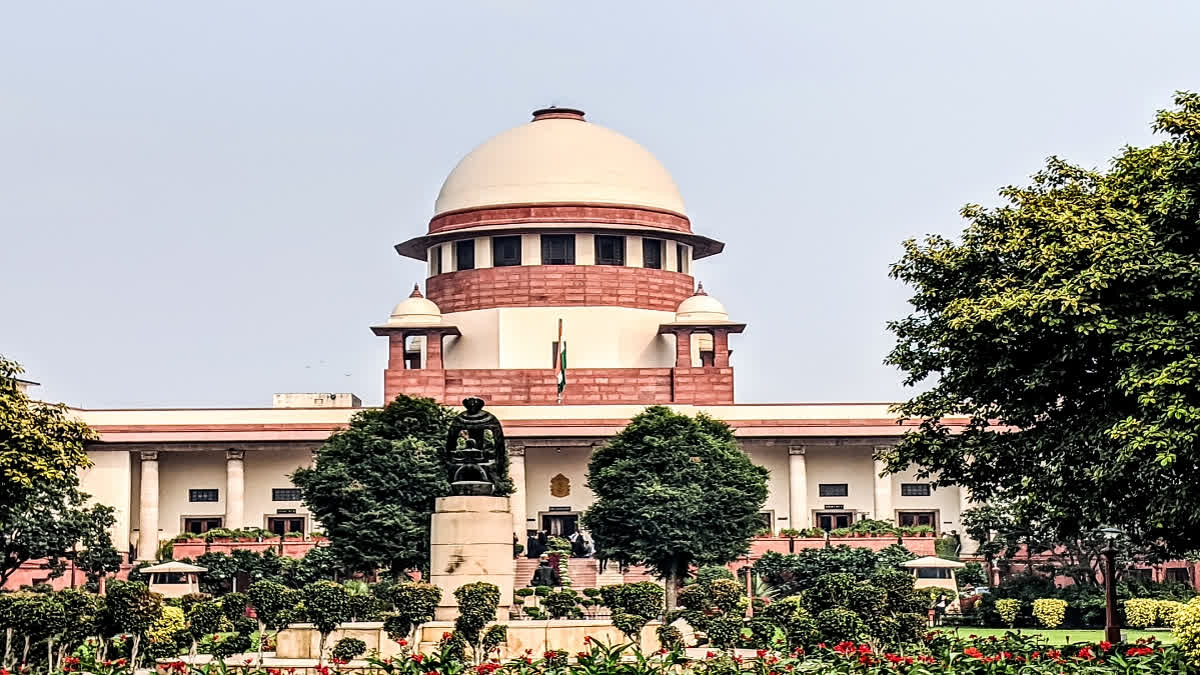New Delhi: The Lok Sabha Secretariat has told the Supreme Court that sharing credentials of Lok Sabha login portal can be susceptible to potential national security hazards and can, not only render the system of the Lok Sabha to cyber-attacks, and potentially disable the system, but can also potentially cripple the functioning of the Parliament of India.
The Secretariat filed its response on a plea by TMC leader Mahua Moitra challenging her expulsion from Lok Sabha over alleged misconduct and sharing of log-in credentials.
"These are valid concerns of national security as well as the dignity and independence of Parliamentary functioning," said the secretariat, in a 154-page affidavit filed in the apex court.
Moitra was ousted from the Parliament after the Ethics Committee of the Lok Sabha found her guilty of jeopardising national security by sharing her parliamentary portal's login credentials with businessman Darshan Hiranandani. Moitra was an Member of Parliament representing Krishnanagar constituency in West Bengal before her expulsion.
The affidavit submitted that the decision arrived at by the Parliament as a sovereign organ under the Constitution after following the internal procedure cannot be tested on the basis of doctrine of proportionality as any such exercise will be contrary to the doctrine of separation of powers, which is a basic feature of the Constitution of India.
It contended that providing access to such confidential information available exclusively to MPs and their support staff, who are authorised to access these by the Speaker, to unauthorised personnel is a gross violation of the Rules of Procedure, as well as amounts to misconduct, unbecoming of a member, that can be independently examined to be a ground of expulsion from the House by the Lok Sabha.
The affidavit said Moitra has also admitted to have not only shared the login credentials of the MP portal – the login and password – but also the OTP, which is generated every time one attempts to login to the portal using the aforesaid credentials.
It added that generation of OTP is an additional security feature, whereby whenever one attempts to login using the aforesaid credentials, an OTP is generated and sent to the MP's mobile number so as to enable the MP to prevent any unauthorised access.
"It is only upon entering the OTP (the additional layer of security) that one can enter the MP Portal. The fact that the petitioner shared even the OTP every time Mr. Hiranandani wanted to access the confidential portal shows that the petitioner had consciously permitted illegal, impermissible and unwarranted access to the privileged MP Portal by an unauthorised third party," said the affidavit.
The Ethics Committee's recommendation and report followed a complaint by BJP MP Nishikant Dubey and advocate Jai Anant Dehadrai alleging that Moitra had accepted cash in exchange for asking certain questions in the Parliament. She was allegedly accused of posing several queries in Parliament concerning the Adani group of companies at the behest of a rival businessman, Darshan Hiranandani.
The affidavit said that moreover, the committee, in its report, had categorically sought information from the Ministry of Home Affairs, Government of India on the contents of the aforesaid portal.
"The Ministry has clarified that key parliamentary functions are available only through the portal including access to list of questions, Bills, meeting agenda papers, notices, background notes as well as draft reports which are highly confidential information. These documents are not to be made available in the public domain," said the affidavit.
The affidavit contended that the petitioner has thus admitted to committing the very serious act of providing unauthorised access to a portal, exclusively meant to be accessed by the Members of the Parliament.
"That the assertions of the petitioner that such sharing is permissible and in fact encouraged the Parliamentary custom, is incorrect and vehemently denied. The Members Portal of the Lok Sabha provides access to very sensitive information as well as various Draft Bills under consideration, as well as Committee Reports that are confidential, and not available in public domain and are not meant to be shared to any unauthorised personnel," said the affidavit.
The affidavit said it is noteworthy that the OTP was shared by the petitioner on 47 occasions, and the only justification that has been provided by the petitioner in lieu thereof is that she needed "typographical" assistance to type her questions on 47 occasions from someone stationed in Dubai.
Seeking dismissal of Moitra's plea, the Secretariat said that the present writ petition is not maintainable in light of Article 105 and Article 122 of the Constitution.
"The present petition does not satisfy the threshold of judicial review of legislative action that is permissible under the scheme of the Constitution of India. That Article 122 envisages a framework wherein the Parliament is allowed to exercise its internal functions and powers without judicial intervention in the first instance as the Parliament is sovereign in respect of its internal proceedings," it said.
A bench comprising Justices Sanjiv Khanna and Dipankar Datta has scheduled the matter for hearing on May 6.
On December 8, the Lok Sabha passed a resolution to expel Moitra from the Parliament in view of the Ethics Committee recommending her disqualification as an MP. Her expulsion was recommended by the committee on the basis of Hiranandani's affidavit saying she accepted bribes to ask his questions targeting the Adani Group.



